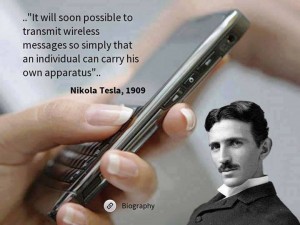Republished by Blog Post Promoter
 Nikola Tesla, the greatest inventor who ever lived, commented on Albert Einstein’s Theory of Relativity in a 1934 article published in the :
Nikola Tesla, the greatest inventor who ever lived, commented on Albert Einstein’s Theory of Relativity in a 1934 article published in the :
“I hold that space cannot be curved, for the simple reason that it can have no properties. It might as well be said that God has properties. He has not, but only attributes and these are of our own making. Of properties we can only speak when dealing with matter filling the space. To say that in the presence of large bodies space becomes curved is equivalent to stating that something can act upon nothing. I, for one, refuse to subscribe to such a view.”
(New York Hearald Tribune, 11 September 1932)
Tesla was critical of Einstein stating that his theory of relativity was:
“a beggar wrapped in purple whom ignorant people take for a king” and “a mass of error and deceptive ideas violently opposed to the teachings of great men of science of the past and even to common sense… the theory wraps all these errors and fallacies and clothes them in magnificent mathematical garb which fascinates, dazzles and makes people blind to the underlying errors…. its exponents are very brilliant men, but they are metaphysicists rather than scientists. Not a single one of the relativity propositions has been proved.”
He also commented:
” Supposing that the bodies act upon the surrounding space causing curving of the same, it appears to my simple mind that the curved spaces must react on the bodies, and producing the opposite effects, straightening out the curves. Since action and reaction are coexistent, it follows that the supposed curvature of space is entirely impossible – But even if it existed it would not explain the motions of the bodies as observed. Only the existence of a field of force can account for the motions of the bodies as observed, and its assumption dispenses with space curvature. All literature on this subject is futile and destined to oblivion. So are all attempts to explain the workings of the universe without recognizing the existence of the ether and the indispensable function it plays in the phenomena.”
Einstein’s Reply on this :
“No amount of experimentation can ever prove me right. A single experiment can prove me wrong.”
(New York Times, 11 July 1935, p23, c.8)
It is also rumored that when Einstein was asked how it felt to be the smartest man on Earth, he replied, “I wouldn’t know. Ask Nikola Tesla”.
